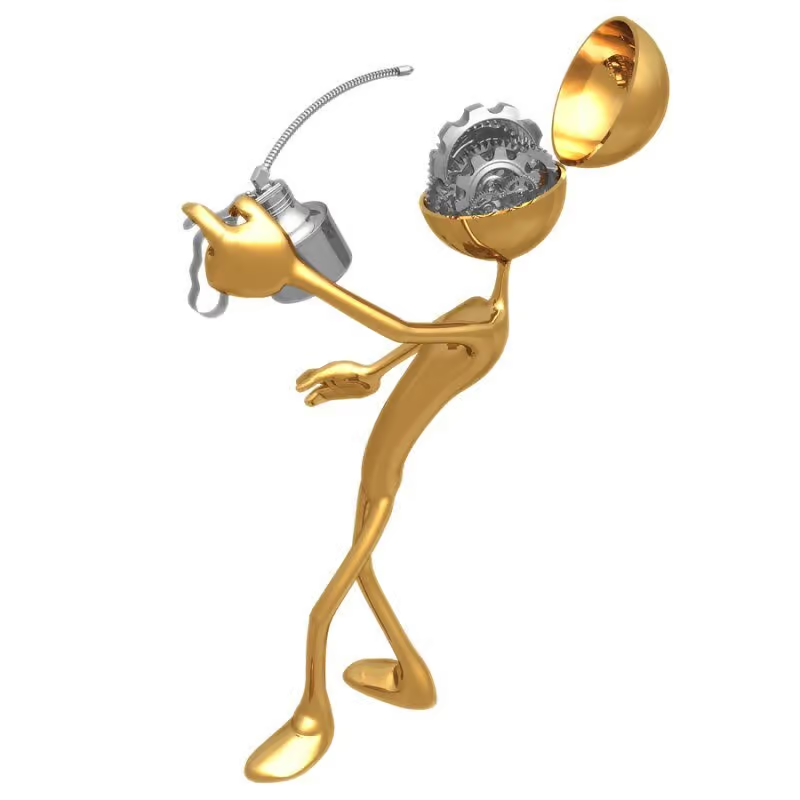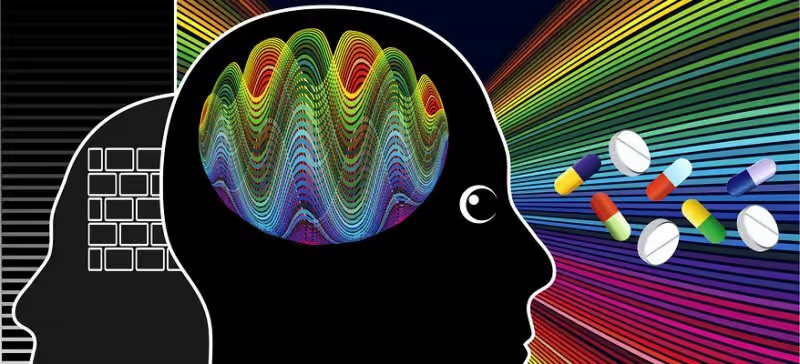Table of Contents
If you’ve spent any time here on Nootropics Expert®, you have a good idea how certain nootropics can benefit your brain. But you may be still wondering how to create the best nootropic stack.
The thing is if you’re just getting started with nootropics, the choices can seem overwhelming. Will one nootropic work? Will it take more that one supplement to solve my problem? If more than one, how do I combine other nootropics for best results?
Here are some tips that should help …
 If you are a university student, an entrepreneur, a business executive, a stay-at-home mom or dad, or a senior – what are you trying to improve?
If you are a university student, an entrepreneur, a business executive, a stay-at-home mom or dad, or a senior – what are you trying to improve?
It could be just one thing you want to work on. Like improving your memory. Maybe you have a difficult time focusing like I did. Or you find learning new material, skill or language an insurmountable problem.
You could have an issue with anxiety, or bouts of depression. Procrastination could leave you feeling like a failure because of a lack of motivation.
Put some thought into this now because you’ll save yourself a lot of time and money by figuring out what you are trying to fix first.
If it’s just one thing you want to fix or support, you’ll have an easier time putting together the right beginner nootropic stack. And often it will only take 3 or 4 supplements to get you where you need to be for your own nootropic stack.
Later in this post you’ll get specific suggestions on nootropics for:
- cognition, thinking, and decision-making
- memory
- anxiety and depression
- energy and motivation
- brain repair and maintenance
For many of us, it’s more than just one problem we’re dealing with.
In my case, the combination of Adult ADD and hypothyroidism caused problems with anxiety, cognition, focus, memory, and depression. That’s a lot to deal with and a lot to fix.[ii]
The good news is it’s entirely possible with the right combination of your own nootropic stacks to address each of these issues. My life is a good example of what’s possible with the right nootropic stack.
I was able to restart my career. My marriage is better than I ever dreamed possible. And my future looks amazing. All due to an experienced nootropic stack regimen, if you will.
But to be perfectly honest with you, one nootropic that works for me, may not work as well for you. Each of us have unique brain “wiring” when it comes to nootropic stacking.
Our chemical makeup is different. And is affected by foods we eat, where we live, the air we breathe, the genes we inherited from our parents, and more.
So experimentation is key. Pick your top choice of something you’d like to improve. Once you find something that works reasonably well, go to the next thing on your list.
With time, effort, and diligent experimenting you’ll find the perfect nootropic stack for you.
Your First Nootropic Stack
My recommendation is to create your own nootropic stack when starting out.
 Tailor your stack to each issue your trying to solve. It’ll likely be more expensive because you need to get each individual nootropic or supplement.
Tailor your stack to each issue your trying to solve. It’ll likely be more expensive because you need to get each individual nootropic or supplement.
The advantages at first outweigh the cost in my opinion. When you find something that works, you then need to figure out how much of that nootropic works best with your brain and body.
If you try something and it doesn’t work as well as expected, or what you were promised in the marketing hype, or what you read on the forums – pitch it.
And try something else.
Flexibility and experimentation is key when you’re getting started with nootropics. A pre-formulated stack doesn’t allow that flexibility.
Keep that pre-formulated option in reserve until you nail down what works best for you. Then look for a nootropic stack that fills all your requirements.
Let’s briefly look at some of your options for major issues to get you started. This is by no means an exhaustive list but a way to point you in the right direction.</p.
Use the search function on Nootropics Expert to find every nootropic that works for memory, or depression, or anxiety, or ADHD, or traumatic brain injury, or whatever it is you need to fix or improve.
Nootropics for Cognition, Thinking and Decision-Making and Nerve Growth Factor
Cognition is the mental action or process you go through when learning something new and understanding it through thought, experience and your physical senses.[iii]
Cognition includes thinking, knowing, short-, working-, and long-term memory, decision-making and problem solving.
That’s a tall order to cover and will likely take more than one nootropic. You can start with:
- Alpha GPC or CDP-Choline. Both nootropics help boost acetylcholine (ACh) in your brain. ACh is associated with memory and learning.
- Lion’s Mane Mushroom. Lion’s Mane increases Brain Nerve Growth Factor or neurogenesis. Improving attention, focus, thinking, depression, anxiety, and helps repair damaged neurons.
- N-Acetyl L-Tyrosine (NALT). NALT is a bio-available form of L-Tyrosine which is a precursor to dopamine in your brain. More dopamine helps improve alertness, focus, working memory and executive function (decision-making).
- Pine Bark Extract. From the French Maritime Pine Tree, Pine Bark extract is used primarily to improve cerebral blood flow. Studies and personal experience show it boosts memory and cognition.
- Vitamin B6. B6 is a required coenzyme for the synthesis of most major neurotransmitters in your brain. And helps enhance alertness, cognition, energy, memory and mood.
- Vitamin B9. Folate as a nootropic is involved in the synthesis of dopamine, epinephrine, norepinephrine and serotonin. It’s involved in the synthesis of DNA, RNA, gene expression, amino acid synthesis a myelin synthesis and repair.
- Vitamin B12. B12 is essential for the synthesis of DNA, RNA and neurotransmitters in your brain. B12 enhances alertness, cognition, memory, decision-making and mood.
Nootropics for Memory and Cognitive Function
We use several different types of memory every day. Short-term memory is also known as primary or active memory. And is limited to what you remember for 20 to 30 seconds.
Long-term memory is the type of memory associated with an event or information you acquired long ago. This is a complicated form of memory influenced by your perception of an event or thing, conditioning or any other input. And is encoded using long-term potentiation and strengthening neurons and synapses.
Working memory is distinct from short-, and long-term memory. These are memories that are not only remembered, but simultaneously processed with information that is important to you. You remember the purpose of the information, and why you decided to remember it.[iv]
Each type of memory can be assisted by different nootropics. Because neurotransmitters, cerebral blood flow, long-term potentiation, hormones and more all come into play for memory.
- Alpha GPC or CDP-Choline. Both nootropics help boost acetylcholine (ACh) in your brain. ACh is associated with memory and learning.
- DHA (Omega 3). DHA makes up a large portion of your brain’s gray matter. This fatty acid helps form cell membranes, neurons and synapses which are needed to form and encode memories.
- Huperzine-A. Hup-A helps promote memory by increasing acetylcholine levels.
- L-Theanine. Found naturally in green tea and available as a nootropic supplement, L-Theanine helps boost dopamine and serotonin. Improving anxiety, focus, learning, and mood.
- Noopept. Noopept stimulates dopamine, nicotinic and serotonin receptors in your brain. Boosting cognition, memory, retention, logical thinking, improving your reflexes and mood.
- Phosphatidylserine (PS). PS is vital for brain health. Highly concentrated in cell membranes, PS helps in the release, storage and activity of neurotransmitters and receptors. Boosting cognition, focus, memory and recall.
- Piracetam. The original nootropic, Piracetam influences AMPA and NMDA receptors in your brain. Affecting learning and memory.
For more options and to learn more about how memory works, see my post on:
Best Nootropics for Learning and Memory
Nootropics for Anxiety and Depression
Do you remember what it used to be like to be in a ‘good mood’ all of the time? Anxiety and depression are something most of us have had to deal with at one time of another.
For me, being Adult ADD and hypothyroid was like a double whammy. And it took a while to dig out of the hole I was in.
Anxiety[v] and depression[vi] are often ‘grouped’ together both in nootropic circles as well as in the psychiatric/medical world. But they are two distinctly different conditions. Even though the cause of anxiety and depression may overlap.
All kinds of conditions can contribute to anxiety and depression. Neurotransmitter levels that are out of balance can cause severe depression. Illness and stress can cause anxiety and depression.
Poor cerebral blood flow, a lack of Brain-Derived Neurotrophic Factor (BDNF), mental fatigue from lack of cellular energy, Alzheimer’s, Parkinson’s, stroke and more can all cause anxiety and depression.’
Here are a few nootropics that can help. This is by no means an exhaustive list.
And if your depression or anxiety is severe, please, please seek professional help while you’re exploring your nootropic options.
- Aniracetam. This member of the racetam-family of nootropics, Aniracetam is very well known for helping anxiety and depression. And one of my favorites. Aniracetam activates D2 and D3 dopamine receptors in your brain. Improving anxiety, cognition, learning, memory and mood.
- Alpha GPC or CDP-Choline. Both nootropics help boost acetylcholine (ACh) in your brain. ACh is associated with memory and learning. And the choline is needed when stacked with any racetam.
- Ashwagandha. Used for thousands of years in Ayurvedic medicine, Ashwagandha helps relieve stress, fatigue, restores energy and concentration, and normalizes blood sugar.
- Bacopa Monnieri. Bacopa is believed by some to be the best nootropic available today. This adaptogen helps prevent chemical and physical stress instead of suppressing them like many modern antidepressants.
- Lemon Balm. This plant from the mint family, Lemon Balm inhibits the GABA transaminase enzyme. Which in turn helps maintain adequate levels of GABA in your brain. Resulting in a calming effect and relieving anxiety and depression.
- Rhodiola Rosea. Rhodiola increases AMPK which helps decrease depression and stress-related mood swings, reduces fatigue, stimulates energy and alertness and boots cognition.
- Sulbutiamine. Synthesized in the lab from Vitamin B1 (thiamine), Sulbutiamine is another favorite of mine because it boosts memory, motivation and is a heck of an antidepressant.
- Vitamin B6. B6 is a required coenzyme for the synthesis of most major neurotransmitters in your brain. And helps enhance alertness, cognition, energy, memory and mood.
- Vitamin B12. B12 is essential for the synthesis of DNA, RNA and neurotransmitters in your brain. B12 enhances alertness, cognition, memory, decision-making and mood.
To learn more about anxiety and depression, and even more options on nootropics that can helps alleviate the symptoms of each, see my posts on:
Best Nootropics for Depression
Nootropics for Energy and Motivation
If you’ve ever felt mentally drained after writing an exam, an intense study session, a misunderstanding with your partner, or working out a business problem ▬ nootropics can help.
Energy and motivation kinda’ go hand-in-hand in my book.
When I’m energized, it usually translates into motivation to get things done. When energy stores are depleted in my brain and body, I’m burned out and nothing much is going to happen.
Mental fatigue has a variety of causes. Depleted neurotransmitters can cause fatigue as well as a host of other issues. A lack of Adenosine Triphosphate (ATP) which is the energy source for brain cells is another cause of mental fatigue. And leads to neurodegenerative disease.
Hormones that are out of balance can cause fatigue. And poor cerebral blood flow which provides oxygen and nutrients to brain cells can result in fatigue.
The amount of available mental energy has a direct influence on cognitive and mental performance. Let’s look at the nootropics that can fix mental fatigue and boost motivation.
- Acetyl L-Carnitine (ALCAR). ALCAR boosts acetylcholine (ACh) and transports fatty acids through cell membranes into mitochondria for use as brain cell fuel. One of my favorite nootropics, ALCAR increases memory, mental alertness, fluid thought and is a powerful antioxidant.
- Alpha Lipoic Acid. Lipoic acid boosts levels of acetylcholine (ACh) and glucose uptake. And regenerates depleted antioxidants already present in your brain including Vitamin C, Vitamin E, glutathione and CoQ10. Boosting cellular energy and memory.
- Coluracetam. One of the newer racetams, Coluracetam works as a choline uptake enhancer. And improves AMPA potentiation. The net result is a boost in energy levels. Unlike prescription stimulants, Coluracetam offers a more relaxed, calm and free-minded kind of thought-processing.
- CoQ10 & Ubiquinol. CoQ10 is essential for producing Adenosine Triphosphate (ATP) that fuels the mitochondria in brain cells. Improving athletic performance, works as an antioxidant, and battles fatigue and depression.
- Creatine. Creatine acts as fuel for your brain cells. And provides ‘energy on demand’ when you need it.
- NADH. NADH is a coenzyme used in the formation of ATP, the energy source for mitochondria in your brain cells. NADH boosts alertness, mental performance, energy and memory.
- Noopept. This peptide-derived nootropic related to the racetam family, Noopept increases BDNF, and stimulates dopamine, nicotinic and serotonin receptors. Boosting energy, cognition, memory, logical thinking, and improves reflexes and mood.
- Phenylpiracetam. A Russian derivative of Piracetam, Phenylpiracetam improves concentration, memory, motivation, mental energy and offers a stimulant effect.
- Rhodiola Rosea. Rhodiola increases AMPK which triggers the use of stored energy from fats in your brain cells. Boosting alertness, energy and cognition while decreasing depression and stress-related mood swings.
- Pramiracetam. A derivative of and more potent than Piracetam, Pramiracetam stimulates choline uptake in your brain. Boosting energy levels, providing focused stimulation for better mental drive and motivation.
To learn more about, and see even more options for energy and motivation, see my post on:
Hacking Motivation with Nootropics
Nootropics for Brain Repair and Maintenance
According to the American Center for Disease Control (CDC) an estimated 1.7 million in the US suffer from Traumatic Brain Injury every year.[vii]
And that’s just for the USA. This is clearly a world-wide problem for the human race.
Brain injury covers a lot of territory and includes concussion, Post Stroke Syndrome, sports and athletic injuries, damage from pharmaceuticals, environmental toxins, bad food and water, polluted air and more.
The mechanics of injury can affect cerebral blood flow, torn tissue, damage to neurons, altered brain waves and neurotransmitters, free radical and oxidative damage and more.
Now the “official” line from the FDA and other governmental authorities in the USA and many countries world-wide, nootropic supplements and other ‘natural’ substances cannot repair brain injury.
While this is certainly not medical advice, and you should absolutely seek professional medical help for brain injury, neurohackers have found relief on their own experimenting with nootropics. Here’s a small sample of what we’ve found useful:
- CDP-Choline. CDP-Choline provides your brain with choline which aids in the synthesis of acetylcholine (ACh). And cytidine in CDP-Choline converts to uridine which is important for neural membrane synthesis.
- DHA (Omega 3). DHA makes up a large portion of your brain’s gray matter. This fatty acid helps form cell membranes, neurons and synapses which are needed to form and encode memories.
- Phosphatidylcholine (PC). PC is a phospholipid which helps build and repair brain cell membranes.
- PQQ. The enzyme cofactor PQQ facilitates the growth of new mitochondria in your brain cells. Boosting the production of nerve growth factors in cells that support creation of new neurons. And reduces inflammation and oxidative stress.
- Pramiracetam. This derivative of Piracetam, Pramiracetam increases acetylcholine receptors in your brain. By stimulating choline uptake in your brain, this nootropic boosts energy levels and improves cognition and motor coordination.
- Pterostilbene. Found in cranberries, blueberries and grapes, Pterostilbene is a potent antioxidant, stimulates Brain-Derived Neurotrophic Factor (BDNF), and promotes neuroplasticity. By reducing oxidative stress, Pterostilbene helps prevent heart attacks and stroke.
- Resveratrol. This polyphenol antioxidant found in the skin of grapes, Resveratrol improves blood flow and reduces inflammation. Improving cell survival and neurogenesis in the hippocampus, resulting in better memory and learning.
- Turmeric. Turmeric is unique in its ability to reduce inflammation common to Parkinson’s, Alzheimer’s and brain tumors.
To learn more about PTSD and Traumatic Brain Injury, and the best nootropics to alleviate the symptoms of each, see my posts on:
Treating PTSD with Nootropic Supplements
Best Nootropics for Traumatic Brain Injury
Conclusion
There are many ways to address each issue you’re dealing with when it comes to optimizing brain health and function.
If you’re a nootropic veteran I’m sure you’ll find holes in my recommendations. Each section is most definitely not a conclusive list of nootropics for a single condition.
I encourage you to use the “Search” function on Nootropics Expert®. Enter the issue you’re dealing with and you’ll get a list of articles with suggestions for your nootropic stack.
By no means should you include everything listed under “memory” for example in your stack. One or two options from each section can help you toward your ideal nootropic stack.
Many nootropics work synergistically and together can make a more powerful solution than a nootropic on its own. When combining several nootropics in a stack you’ll want to back off to the lowest recommended dose of each to start.
You also may have noticed that some nootropics appear in several categories. What this means is most nootropic stacks would benefit by including Alpha GPC or CDP-Choline, DHA, and a nature-identical B-Vitamin Complex.
Be sure to click through to each nootropic to review dosage recommendations and side effects. Each article has extensive references to clinical studies as well.
Pre-Formulated Nootropic Stacks
Early in this article I mentioned pre-formulated stacks as an option that you could use to replace individual nootropic supplements.
Finding the right pre-made stack can save you time and often quite a bit of money.
After experimenting with many of the well-known stacks, I settled on Mind Lab Pro®.
Mind Lab Pro contains therapeutic dosages of 11 top quality natural nootropics including; CDP-Choline, Bacopa Monnieri, Lion’s Mane Mushroom, Phosphatidylserine (PS), N-Acetyl L-Tyrosine (NALT), L-Theanine, Rhodiola Rosea, Pine Bark Extract, and Vitamins B6, B9, and B12.
I’ve found it less expensive to use this stack than buying each nootropic on its own. All I’ve had to add is coconut oil, DHA, Aniracetam and Sulbutiamine.
And I’ve recently replaced separate supplements including ALCAR, Alpha Lipoic Acid, CoQ10 and PQQ with Performance Lab® Energy which contains all four nootropics in the dosages I was using. And is less expensive than buying separate supplements.
Check out my reviews on Mind Lab Pro® and Performance Lab® Energy and see if they could work for you too.
If you have questions about building your perfect nootropic stack, please leave a comment in the comment box below. I or another experienced neurohacker in our community will help you out.










Join The Discussion - 124 comments
Furie
October 4, 2024
P.S. I highly recommend explaining how the AMPA and NMDA receptors will help your dear readers in accelerating LTP and LTD in reference to synaptic plasticity. as many are trying to gain new skills and master thier metacognition, even if they aren’t currently aware of their humunculie
David Tomen
October 5, 2024
Good idea Furie. Thanks.